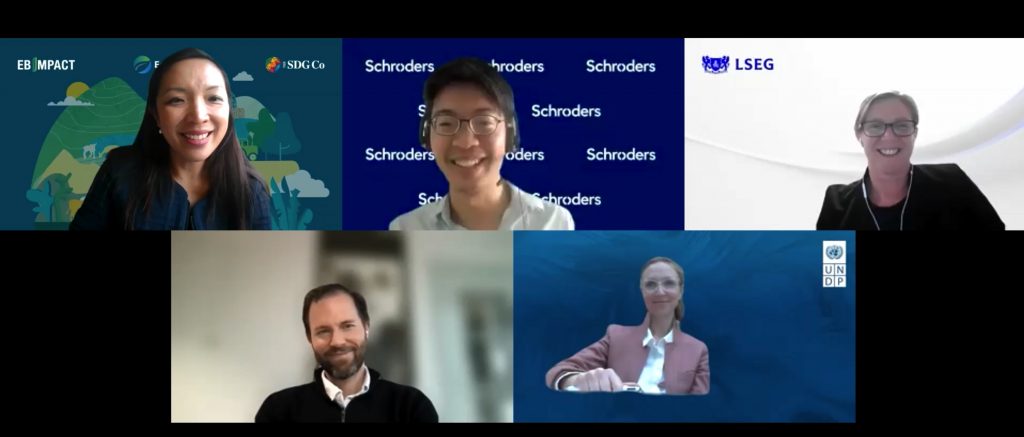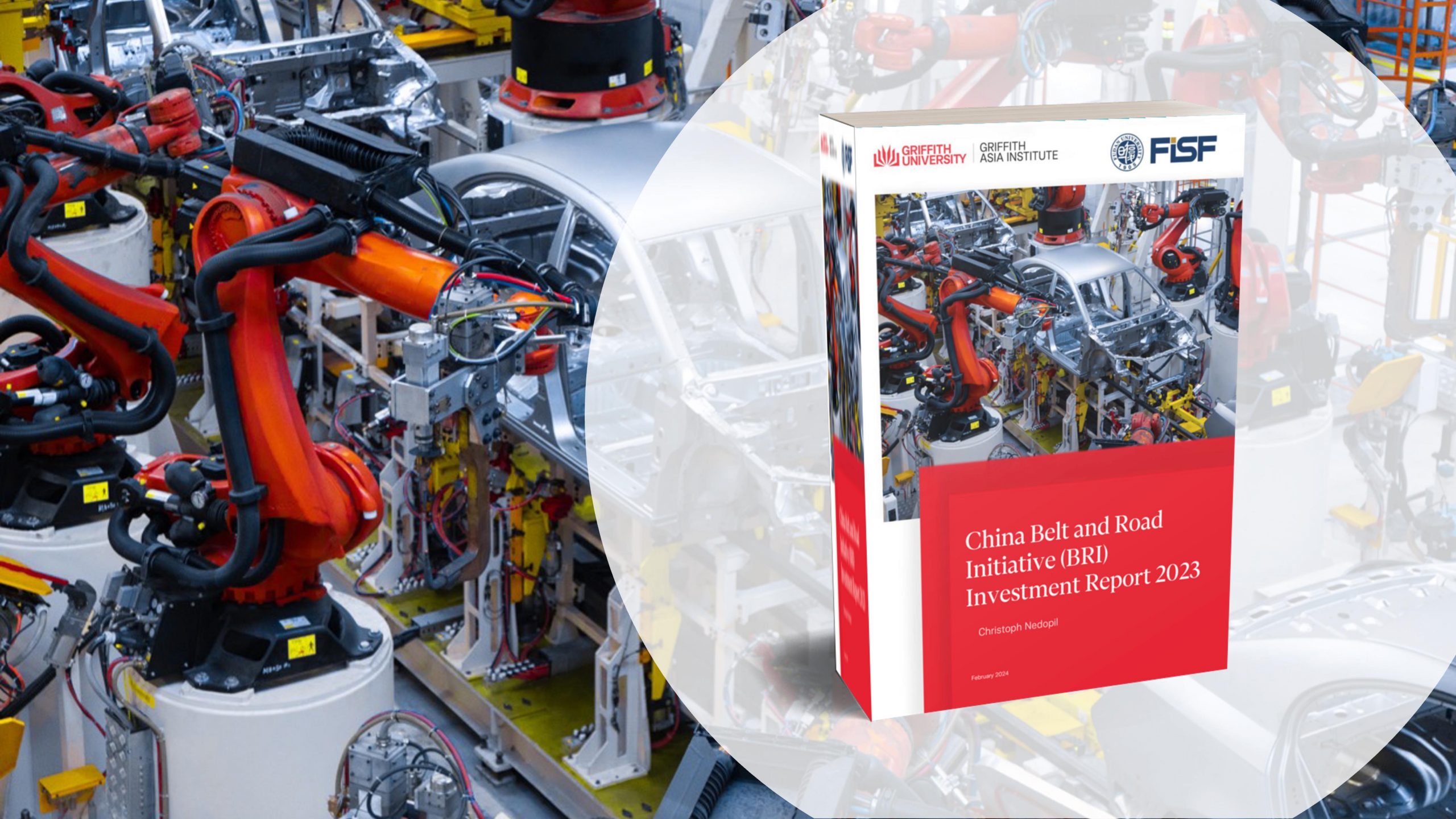On March 31st, 2022, the Eco-Business with strategic support from Refinitiv, an LSEG business, organized its first sustainable finance event with a focus on China.
Among the participants, Christoph Nedopil, Director of the Green Finance & Development Center at FISF Fudan University Shanghai, along with speakers from UNDP China, Refinitiv, and Schroders, participated in a panel discussion. The panelists presented observations and insights of the sustainable development trajectory of China, the impact of relevant Chinese and international green finance standards and taxonomies, and how neighboring Asian economies may understand China’s sustainable development progress.

SPEAKERS AND PANELISTS
The speakers and panelists of the event included some of the leading experts and practitioners in the field of sustainable finance in China and the rest of Asia:
- Violante di Canossa, Chief Economist at UNDP China
- Michelle Cameron, Head of Sustainable Finance and Investment, Asia, Refinitiv (an LSEG business)
- Christoph Nedopil, Associate Professor and Director of Green Finance and Development Center, FISF Fudan University
- Mervyn Tang, Head of Sustainable Strategy, APAC, Schroders
The panel was moderated by Junice Yeo, Executive Director at Eco-Business.
KEY TAKEAWAYS
- Asia is expected to contribute around 60% of global growth by 2030. The development models adopted in Asia will have a determinant effect on the outcome of the 2030 Agenda for Sustainable Development. China, with its massive economy and its Belt and Road Initiative (BRI), has a great influence on sustainable development in the region.
- As Asia ramps up efforts to align with international best practices in sustainable finance and development, many in the region are paying close attention to China, arguably the most powerful economic engine in the region and one of the fastest-growing markets for green finance, for investment interest, opportunities, and direction.
- To effectively accelerate the transition away from carbon-intensive activities, governments should provide clarity and stability on their commitment to green energy and green infrastructure through their financial policies, such as by removing tax breaks and subsidies on coal.
- Compared to voluntary and market approaches, the Asian market, particularly the Chinese market, can be more effectively mobilized by regulatory forces.
- As the world’s manufacturing hub, Asia can produce lots of components and raw materials necessary for the global green transition. However, because the production of these components and materials itself may be carbon-intensive, they generally appear less attractive to ESG-focused investors.
- The evolving ESG and sustainability data now allow decision-makers to make more informed decisions than ever before. As data improve, asset managers are also raising more in-depth and mature demands regarding ESG and sustainability.
SUMMARY OF Event
With China’s announcement to peak carbon emissions by 2030 and reach net-zero by 2060, Asia’s largest economy has gained much attention as the markets with the largest need and supply of green finance outside Europe and the United States. Chinese industries, financial institutions, and enterprises are increasingly compelled to move away from carbon-intensive activities and utilize cleaner energy and technology. As a result of this envisaged transformation, China’s financial markets have attracted attention of global investors keen on environmental, social, and governance (ESG) values, including those from financial markets in Asia, such as Hong Kong and Singapore.
During her short presentation, Violante di Canossa, Chief Economist at UNDP China, shared her experience on providing sustainable finance practices and instruments: UNDP China has released a set of four standards on SDG Impact for enterprises, private equity funds, bond issuers, and development finance. In addition, UNDP China has also developed the SDG Finance Taxonomy for China, building on existing best practices from both China and Europe. But she also recognized that the implementation of such standards would take time. Meanwhile, she highlighted that the harmonization of ESG standards and green taxonomies is encouraging. In general, she believes that the process of implementation is continued learning process, requiring ongoing tests and adjustments.
Christoph Nedopil, Associate Professor and Director of Green Finance and Development Center, FISF Fudan University, gave an overview of China’s green finance journey, from the introduction of green credit guidelines in 2012 to China’s more progressive role on climate issues in 2019 and 2020, with the release of the country’s green bond taxonomy and last year’s Common Ground Taxonomy as a green taxonomy harmonization with the EU. He remarked that currently, both large investments in green and non-green investments are still driving China’s economic development – somewhat neutralizing China’s progress in green finance. He emphasized that the recent “Two Sessions” put energy security and “clean coal” high on the agenda, making a clear prediction of China’s energy transition and climate issues challenging. Christoph Nedopil also highlighted that while China has publicly announced that it will no longer build new coal-fired power plants abroad, the incentives for coal-related projects both domestically and in BRI countries, remain entrenched.
Mervyn Tang, Head of Sustainable Strategy for APAC at Schroders, highlighted three observations on China’s green assets and technologies, and where he saw opportunities for other financial hubs in Asia. First, China is a key source of green capital for the region, with its green BRI initiative being a big part. A lot of emerging market economies in Asia welcome China’s financial support. Second, many Asian countries and regions still lack the technology or resources internally to transition to net-zero. China could potentially be a partner in supporting their decarbonization efforts with its advantages in resources and technological development. Third, the spillover of green technology in China can potentially benefit neighboring countries. The massive scale of investment in green technology development likely coming out of China can be passed on to other economies in the region.
Michelle Cameron, Head of Sustainable Finance and Investment for Asia at Refinitiv, commented on the ESG data landscape and its potential to support green development in Asia. Michelle Cameron saw increased regulatory exposure and massive demand from the market for high-quality ESG information. Asia historically has been a bit of a laggard in the regulatory landscape on ESG and green finance, but this is changing. China leads part of this development in, but there is still a concerning gap between intent and action and results. As to the biggest obstacle to accelerating the green transition, Michelle Cameron noted that turning environmental and climate disclosures from voluntary to mandatory would be encouraging.
All panelists agreed that China has the potential to support Asia in achieving its sustainable development goals, with the note that much more work needs to be done to secure the sustainable future pledged by China and its partners in the region. While it is too early to give a definite answer on China’s influence on sustainable development in Asia, the trends in improvement of data, advancement in technology, harmonization of standards, and introduction of green finance regulations all signal that positive progress is underway.
Dr. Christoph NEDOPIL WANG is the Founding Director of the Green Finance & Development Center and a Visiting Professor at the Fanhai International School of Finance (FISF) at Fudan University in Shanghai, China. He is also the Director of the Griffith Asia Institute and a Professor at Griffith University.
Christoph is a member of the Belt and Road Initiative Green Coalition (BRIGC) of the Chinese Ministry of Ecology and Environment. He has contributed to policies and provided research/consulting amongst others for the China Council for International Cooperation on Environment and Development (CCICED), the Ministry of Commerce, various private and multilateral finance institutions (e.g. ADB, IFC, as well as multilateral institutions (e.g. UNDP, UNESCAP) and international governments.
Christoph holds a master of engineering from the Technical University Berlin, a master of public administration from Harvard Kennedy School, as well as a PhD in Economics. He has extensive experience in finance, sustainability, innovation, and infrastructure, having worked for the International Finance Corporation (IFC) for almost 10 years and being a Director for the Sino-German Sustainable Transport Project with the German Cooperation Agency GIZ in Beijing.
He has authored books, articles and reports, including UNDP's SDG Finance Taxonomy, IFC's “Navigating through Crises” and “Corporate Governance - Handbook for Board Directors”, and multiple academic papers on capital flows, sustainability and international development.





Comments are closed.